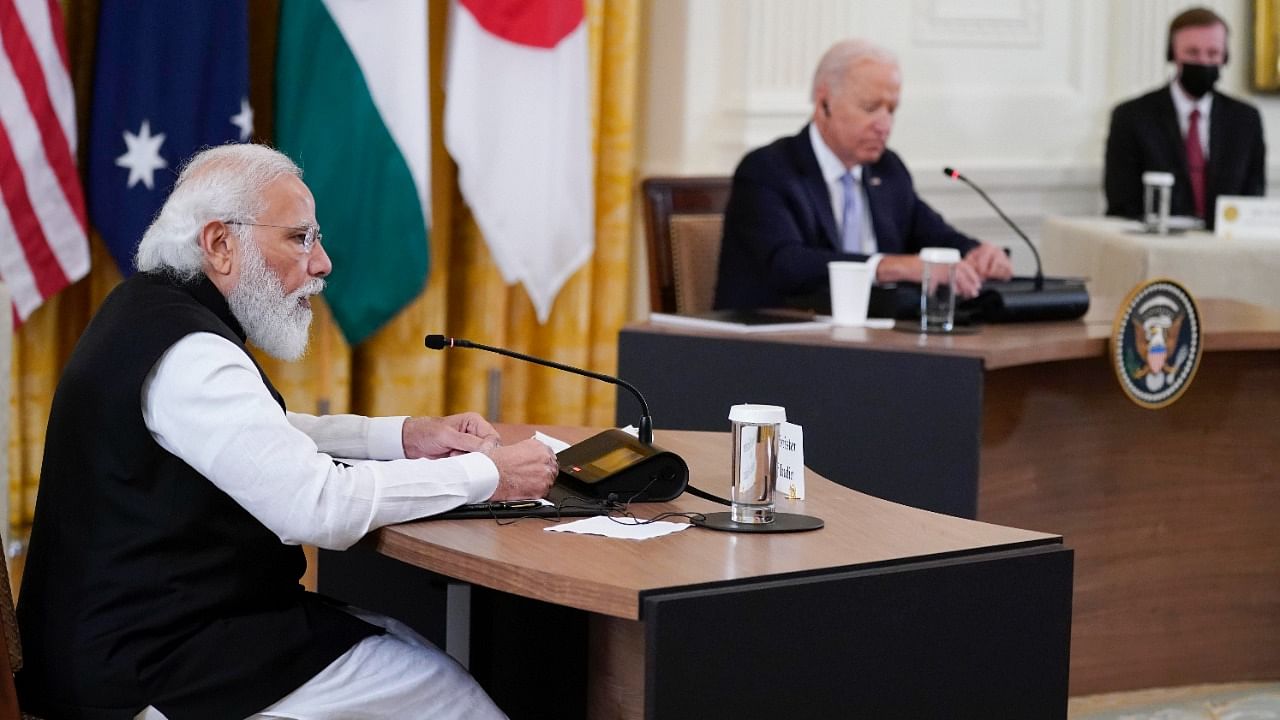
The Quad leaders vowed to bolster security and prosperity in the Indo-Pacific region without being daunted by coercion but kept the four-nation coalition distinct from the recently launched AUKUS, a trilateral alliance of Australia, the United Kingdom and the United States, which focuses on defence cooperation to counter China.
The leaders of India, Australia, Japan and the US discussed the situation in Afghanistan, where the Taliban on August 15 last returned to power through a military campaign tacitly supported by Pakistan. They tacitly sent out a message to Pakistan, denouncing the “use of terrorist proxies” and emphasizing “the importance of denying any logistical, financial or military support to terrorist groups which could be used to launch or plan terror attacks, including cross-border attacks”.
“On this historic occasion we recommit to our partnership, and to a region that is a bedrock of our shared security and prosperity—a free and open Indo-Pacific, which is also inclusive and resilient,” Prime Minister Narendra Modi, US President Joe Biden, Australian Prime Minister Scott Morrison and Japanese Prime Minister Yoshihide Suga said after the first in-person summit of the Quad.
The four leaders did send out a tacit message to President Xi Jinping in Beijing by calling for rules-based order in the Indo-Pacific, amid growing belligerence of China, not only along its disputed boundary with India in eastern Ladakh but also in the South China Sea, East China Sea and the Taiwan Strait. “Together, we recommit to promoting the free, open, rules-based order, rooted in international law and undaunted by coercion, to bolster security and prosperity in the Indo-Pacific and beyond. We stand for the rule of law, freedom of navigation and overflight, peaceful resolution of disputes, democratic values, and territorial integrity of states,” they said in a joint statement issued after summit in Washington D.C. on Friday.
The Quad, however, continued with its benign agenda of countering China’s geopolitical influence in the Indo-Pacific region. It kept the focus on dealing with the Covid-19 pandemic and supplying vaccines to the countries in South Asia, South-East Asia and the Pacific, helping revive economies, ensuring supply chain resilience, supporting the construction of infrastructure, educational initiatives and humanitarian assistance.
The leaders recognized that the shared future of the four nations would be written in the Indo-Pacific, and vowed to redouble efforts to keep the coalition as “a force for regional peace, stability, security, and prosperity”. But they avoided announcing any defence cooperation among themselves to take on China in the Indo-Pacific, thus keeping the Quad distinct from the AUKUS.
The US last week joined Australia and the UK to launch the AUKUS, which appeared to be more like a security alliance, focusing on the development of joint military capabilities and defence technology sharing. The AUKUS will create a framework for the US and UK to support Australia in acquiring a fleet of nuclear-powered submarines.
Though the AUKUS cast a shadow on the Quad ahead of its summit on Friday, Modi told Biden, Morrison and Suga that the four-nation coalition would continue to act as a force for global good.
They issued the Quad Principles on Technology Design, Development, Governance, and Use that will guide not only the region but the world toward responsible, open, high-standard innovation.
India last year thwarted the US bid last year to turn the Quad into a NATO-like security alliance for Asia, as it was not keen to be part of a bloc with an overtly adversarial approach to China, notwithstanding the stand-off between the Indian Army and the communist country’s People’s Liberation Army along the Line of Actual Control in eastern Ladakh. New Delhi was also concerned over the implication of any move to turn the Quad into a US-led military alliance on India’s decades-old strategic partnership with Russia.
Check out DH's latest videos:
